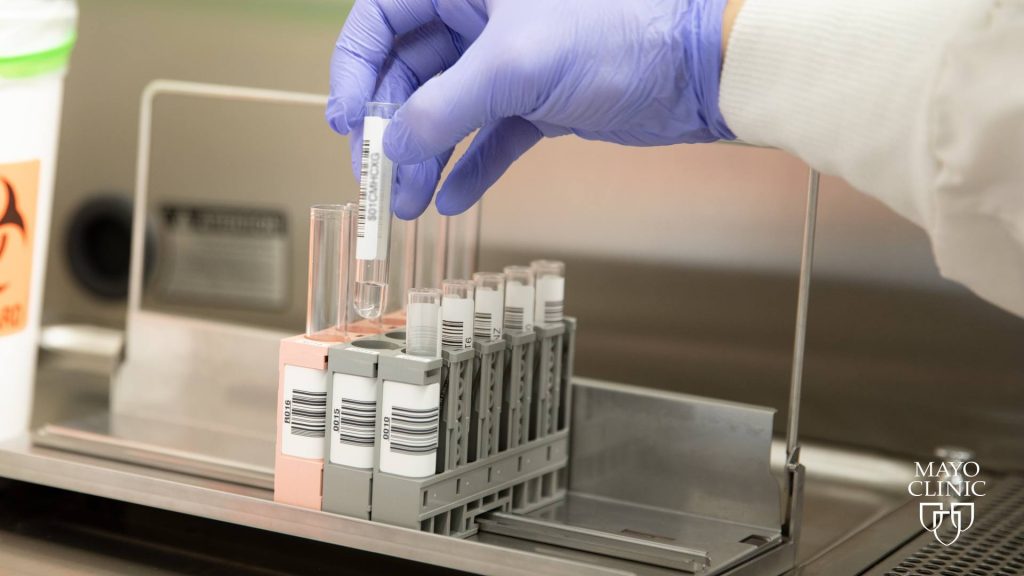
DEAR MAYO CLINIC: There has been a lot of information about different tests for COVID-19, including a test that determines whether you have it and an antibody test. I'm not sure I know what test I should request or if I should get tested? Can you explain the different tests?
ANSWER: Since COVID-19 is such a new disease, much is still being learned about how it spreads and the severity of illness it causes. With all the news around the pandemic, it is understandable that there is a lot of confusion, particularly around who may need testing and how to get testing.
Let's start with who needs testing. Not everyone who develops symptoms of fever, cough, shortness of breath and difficulty breathing will need to be tested. In the U.S., your health care provider will determine whether to test you for COVID-19 based on your signs and symptoms, as well as whether you have had close contact with someone diagnosed with COVID-19, or traveled to or lived in any areas with ongoing community spread of COVID-19 in the past 14 days. Your health care provider also may consider testing if you're at higher risk of serious illness, such as if you are an immunocompromised or have heart disease.
How and where you get a test depends in part on where you live and testing availability. A lot of companies and collaboration already has occurred to expedite testing in the U.S.
In early March, Mayo Clinic developed a real-time polymerase chain reaction test that can identify SARS-CoV-2, the virus that causes COVID-19. The polymerase chain reaction assay has been validated to test respiratory samples collected from suspected COVID-19 patients, including nasopharyngeal swabs, sputum, throat swabs, bronchoalveolar lavages, and bronchial washings.
Patients should speak to their health care provider to determine if it's appropriate for them to receive a COVID-19 test and the specific process. This guidance may vary by facility.
More recently, there has been news about antibody testing, which is different than the diagnostic test to see if you have the virus.
Antibody testing, also called serology testing, determines if someone has been infected in the past. Antibodies are produced by a person's immune system, and these antibodies are critical for control and clearance of the virus. Mayo Clinic announced the development and launch of this test to detect the presence of antibodies specific to SARS-CoV-2. The hope is that the test will help researchers better understand how widespread the virus is. It also would allow them to identify which personal characteristics and environmental factors appear to play a role in how severely the virus affects particular groups of people, or populations.
The other value of this test is that it will be very helpful, even reassuring, to people to know, 'Have I been infected, and I am potentially protected now?' Imagine in the workplace. For health care providers at Mayo Clinic, it would be a great help to know if someone had been infected but maybe did not have symptoms, and has now recovered and can take care of patients — maybe without needing certain personal protective gear.
Another benefit of antibody testing is being able to identify candidates who could donate plasma that could be used to treat others with more severe illness.
The idea here goes back prior to the influenza pandemic in 1918. The thinking is that you take serum, or plasma, from people who have had the disease and have recovered from the disease. You take their antibodies and infuse them into someone who is having a severe case, or rapidly deteriorating, and protect them.
The other thing that plasma can be used for is helping determine if people can be passively protected against future infection. For instance, some people may be familiar with what was done prior to having a hepatitis A vaccine. If you were going to travel to, say Mexico, or other places that had hepatitis A, you would get a shot of immune globulin in the buttock. Well, those were antibodies that were derived from plasma of people who had recovered from hepatitis A.
Looking forward, before we have a vaccine, we might be able to develop an immune globulin to passively protect someone against infection. We'd have to figure out for how long — would it be 12 weeks or six months, but somewhere in there — so you could deploy them without risk.
With COVID-19 being so new, there are still things that aren't known about the virus. It's important to continue to follow the guidelines to prevent the continued spread of COVID-19, including proper hand-washing, not touching your face, maintaining social distancing, and avoiding outings and gatherings.
If you experience symptoms or think that you qualify for any type of testing, you should contact your health care provider. — Dr. Gregory Poland, Vaccine Research Group, Mayo Clinic, Rochester, Minnesota
_______________________________________________
For the latest updates on the COVID-19 pandemic, check the CDC website. For more information and COVID-19 coverage, go to the Mayo Clinic News Network and mayoclinic.org.







